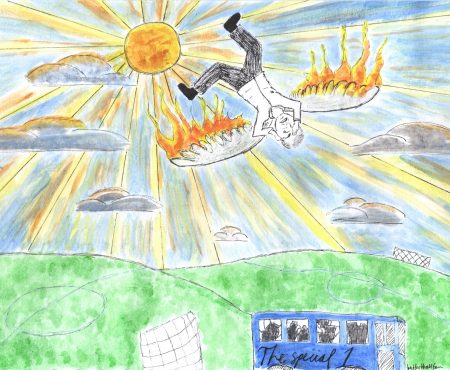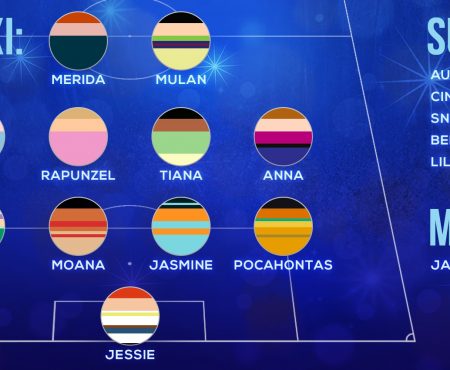I only remember Euro 2008 in brief, blurry snatches. A goal I saw a GIF of here. A recap post I skimmed there.
It was the summer between high school and college, the same summer as my job as an improv comedy teaching assistant that had me on a daily four-hour round-trip bus commute in the sweltering central California heat, the same summer when I spent my free time in my mother’s hospital room while she recovered from her brain aneurysm. Football was happening, but I was elsewhere.
The one lasting impression seared into my mind – and the minds of every other Vatreni supporter I’ve ever spoken to – is of the members of the Croatia National Team sprawled on the ground after their defeat to Turkey in the quarter-finals. They fell where they stood during the penalty shoot-out, heads in their hands to hide their tears.
Even still, I recall it in abstract – their blue kits against the green pitch, more an impressionist painting in my memories than anything else.
And then there was Darijo Srna.
Darijo wept loudly and openly, to the point of drawing the attention of the medical staff and referees. He stayed down longer than the rest of the team. Manager Slaven Bilić eventually managed to coax him to his feet, but the tears never stopped. A defender who preferred to play as a winger and had the heart of a midfielder, Darijo had been the only Croatia player to sink his penalty into the back of the net.
When he was named the new Vatreni captain in early 2009, that exact moment was often brought up as evidence that he was unfit to wear the armband. This never made sense to me. Rather than looking at Darijo’s breakdown as a sign of weakness, I saw a man who loved his country and his team with absolutely everything he had. A steward of the highest degree, a true leader, a captain who wouldn’t be afraid to rip himself open and bare his heart for the world to see.
That’s who he is, and it’s who he has always been.
Darijo learned the value of perseverance in the face of extreme adversity at his father’s side. Uzeir Srna was orphaned as a young child during the Bosniak ethnic cleansing of World War II. Miraculously, Uzeir survived the war as a refugee in Slovenia and was reunited with his older brother Safet years later. He began playing football while stationed in the Bosnian army, and on a trip to present-day Croatia for a friendly match against Neretva, the opposing team asked him to stand in for their injured goalie. The Neretva staff liked him enough to ask him to stay, and so Uzeir settled in Metković. Years later, Darijo was born in that same town.
No small amount of luck went into the extraordinary circumstances that make up the story of the Srna family. However, if it’s true that you make your own luck, Darijo is the man who spins pure gold out of straw for himself and those around him. Indefatigable, he set his shoulder to the wheel of his career at a young age, started pushing, and hasn’t stopped once. Even at his lowest points, his dedication to football and to his family hasn’t wavered.
The Srnas recognized their son’s talent early on and sold vegetables to support his dream. He made the only move in his career when he left Croatia in 2003 and transferred to Shakhtar Donetsk in the Ukrainian Premier League. Since then, Darijo has paid forward everything his family sacrificed for him and then some. Though Uzeir remained in Metković until his death, Darijo provides his family with financial support and funded new turf for Neretva’s grounds. Though far from his family, he puts their needs before his own at every turn. Every goal he’s scored has been dedicated to his older brother Igor, whose name is tattooed above his heart.
Donetsk quickly became his home, and Shakhtar the only club for him. Darijo forged a strong relationship with their owner, Rinat Akhmetov, and worked closely with him to build up Shakhtar’s reputation in the league. As their longtime captain, he has woven himself into the fabric of the club and earned the undying love of its supporters.
The fierce loyalty goes both ways. For thirteen years Darijo has shirked offer after offer and chosen to remain at Shakhtar, no matter the circumstances. Just as he left everything on the pitch for Croatia, he continues to do the same for Shakhtar. He has become their icon and their legend, but he never did any of it for the glory.
Barcelona is the latest club to add their name to Darijo’s extensive list of suitors. Rumor has it the Blaugrana are looking to slot him into the space vacated by Dani Alves last summer. Take that with the world’s largest grain of salt, of course – many have tried to pry Darijo away from Shakhtar, but so far none have succeeded. Chelsea, Bayern Munich and Borussia Dortmund are just a few of the clubs he’s left wanting throughout his career.
If Darijo were to put himself before his club and move away from Shakhtar at this point, there might be a small kernel of sense to it. While Darijo continually says that he cannot in good conscience turn his back on Shakhtar and the people of Donetsk, there’s no denying that he’s in a dark and difficult place right now. The war in Donbass has caused widespread destruction in eastern Ukraine. Millions of residents have either been internally displaced within Ukraine or fled the country altogether in the midst of the civil war. Only one month after the war began, Darijo and his family were evacuated from Donetsk. Shakhtar relocated its headquarters to Kyiv and its home arena to Lviv. The team began sending weekly convoys of supplies to Donetsk, something they’ve continued for more than two years now. Football carried on, despite doubt that they could ever return to their homes. After eleven years spent building a life for himself and his family in the city he loved, Darijo found the rug pulled out clean from beneath his feet.
Remarkably, he remained standing.
That is perhaps the central conceit of Darijo’s character. Time after time, the chaos of the universe has knocked him down. Time after time, he clawed his way back up and somehow stood straighter. He never let any of it harden him – selfless to a fault, he still gives all he has for his club, his home, his family.
And, of course, for Croatia.
Before Euro 2016, Darijo confirmed that this would be his last tour with the national team. He penned his retirement date as the Vatreni‘s final match. He almost never made it to France at all – with his father’s health in steady decline, he returned to Metković and told his family he would skip the tournament to be with them. Uzeir told him to go, to play, to finish what he started, to make Croatia proud.
Darijo led his team onto the pitch for their first match against Turkey, one of four players on the current squad who lived through their quarter-finals defeat eight years earlier. Luka Modrić scored a stunning goal that gave Croatia the victory. It looked to be a brilliant start for a team many were calling the dark horse of the tournament, but after leaving the Parc des Princes, Darijo received the news that his father had passed away.
This would be the final blow to break anyone else. Truthfully, I think we all would have understood if Darijo chose to bow out of the tournament. Amidst speculation that that was exactly what was happening, Darijo flew home to spend time with his family, attended his father’s memorial, and returned to France with little fanfare. It’s what his father wanted, he said. Nobody doubted it for a moment.
In stark contrast to eight summers ago, I was glued to Euro 2016. Somehow – against all logic and reason, despite the odds stacked so high against us, in the face of mayhem from the ultras, with a manager whose credentials are sorely lacking – I truly believed that this would be our year. It was a delusional thought, but one that lulled me to sleep night after night. I imagined Croatia in the finals, and I imagined Darijo lifting the trophy.
Unfortunately, football doesn’t always follow my preferred emotionally fulfilling narrative. Portugal knocked Croatia out during the round of sixteen with a goal in the very last minutes of overtime. It was an exhausting match with a bitter end, and when Darijo collapsed to the ground after the final whistle, there was an overwhelming sense of déjà vu.
This time, no one came to his aid. He picked himself up on his own, held his head high as tears streamed down his face, and turned to the Croatia fans one last time.
In the end, this was the way it had to be. Nothing came easily to the team, and life did its best to crush Darijo beneath its boot. Yet there he was, triumphant despite it all, in incomprehensible pain and managing to smile through it. He strapped on the captain’s armband and gave his final gift to his country. The Vatreni couldn’t have asked for a more loyal and selfless steward.
In the letter posted after officially announcing his retirement, Darijo waxed rhapsodic about his time with Croatia. While incredibly emotionally charged, none of it rang trite or hollow. As with everything else he’s done in his life, it came straight from the heart. He wrote, “If you ask me what would I rather be – a triple world champion with any other national team or what I am now with Croatia – I do not have to answer. Playing for Croatia was dreaming awake.”
Since then, Darijo has made it clear that he’s looking to see out the last of his playing years with Shakhtar. His dream is to return to Donetsk and retire at the Donbass Arena. From there, he’s already expressed that he’ll go for his UEFA Pro License and begin his new career in coaching. He has to believe in a brighter future for himself, his family, his team, his community, the world at large – if he were to look anywhere but forward, he might feel tempted to stop altogether, and even at thirty-four years old he isn’t sure he knows how.
The man whose mere existence is a miracle, who sold potatoes to afford his first pair of boots, who painstakingly carved out his place in club and country to become a beloved figurehead, who led Croatia to victory in every match he scored in, did not come this far to simply fade away. If there is only one immutable truth about Darijo Srna, it is that he always has more to give.







